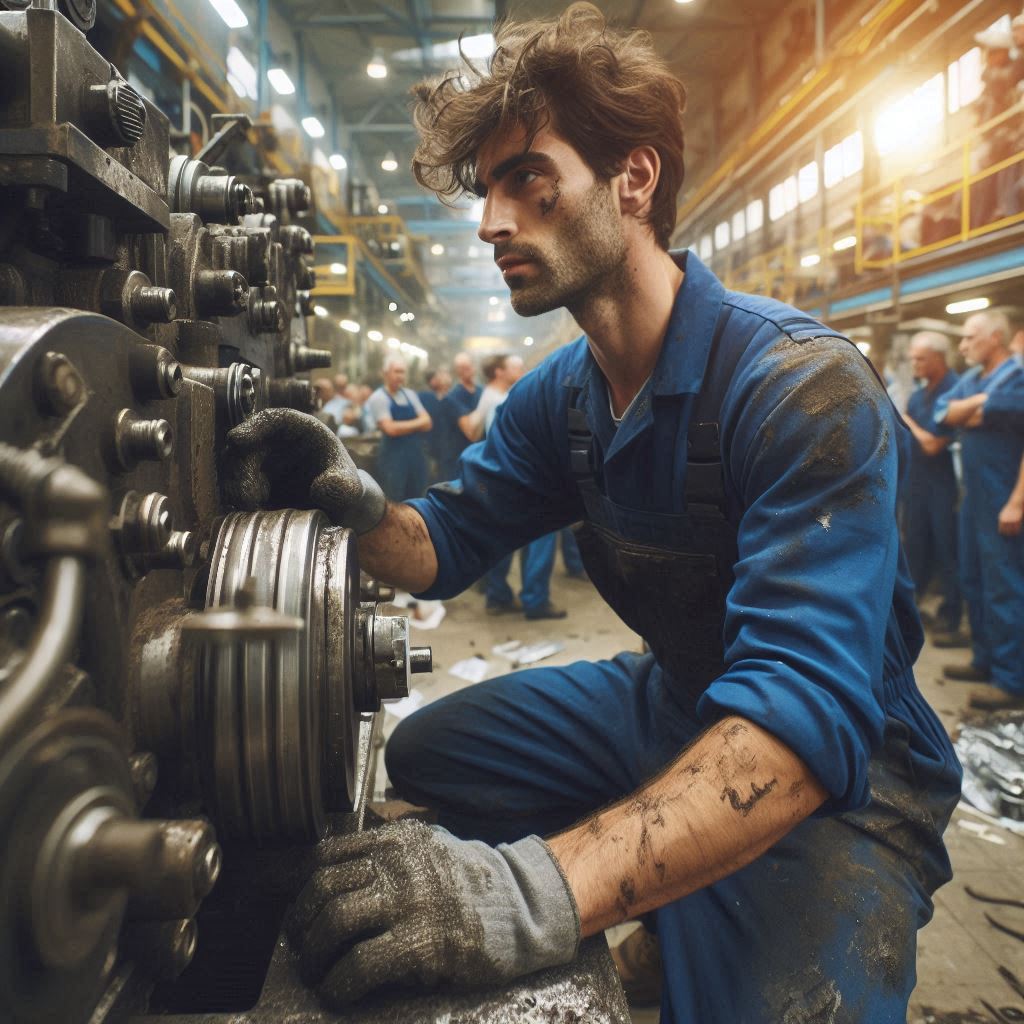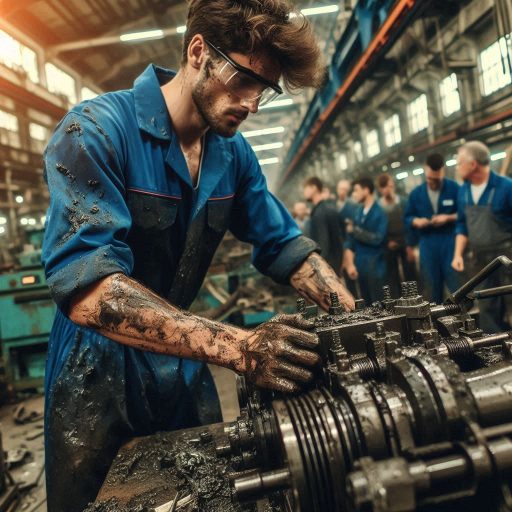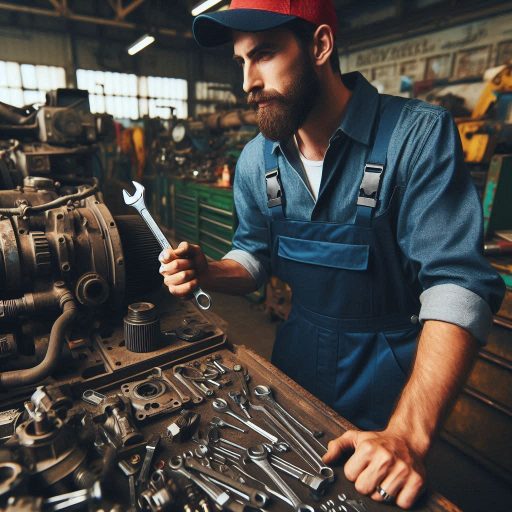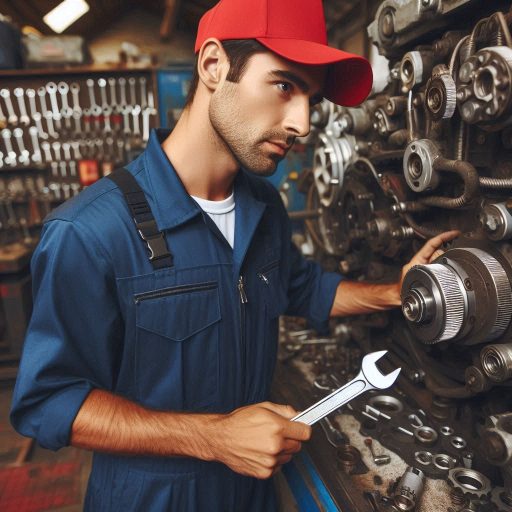Introduction
Training programs are essential for industrial machinery mechanics to develop the skills needed for effective equipment maintenance and repair.
These programs provide in-depth knowledge of machinery systems, troubleshooting techniques, and repair methods.
Proper training ensures that mechanics can handle complex equipment and address issues efficiently.
The demand for skilled industrial machinery mechanics is rising due to advancements in technology and industrial expansion.
As industries evolve, machinery becomes more complex, requiring specialized knowledge and skills.
Trained mechanics are needed to keep up with these advancements and ensure machinery operates smoothly.
The growing demand highlights the need for comprehensive training programs to prepare future mechanics for the challenges they will face.
Training programs play a crucial role in ensuring safety and efficiency in the workplace.
They teach mechanics how to operate machinery safely and follow proper maintenance procedures.
This training reduces the risk of accidents and equipment failures, contributing to a safer work environment.
Well-trained mechanics can also identify and resolve issues more quickly, improving overall operational efficiency.
Training programs are vital for preparing industrial machinery mechanics to meet industry demands.
They ensure that mechanics have the skills needed for effective maintenance and repair, support safety in the workplace, and enhance operational efficiency.
Overview of Industrial Machinery Mechanics
What Industrial Machinery Mechanics Do
Industrial machinery mechanics are responsible for maintaining and repairing various types of industrial equipment.
They perform routine inspections and preventive maintenance to ensure machines operate smoothly.
Mechanics diagnose and troubleshoot mechanical issues, replacing or repairing faulty components.
They work with machinery like conveyor systems, pumps, and heavy equipment.
Their role involves reading technical manuals and schematics to understand machine functions.
Mechanics also keep detailed records of repairs and maintenance activities.
Importance of Their Role
The role of industrial machinery mechanics is crucial in ensuring operational efficiency and safety.
Well-maintained machinery minimizes downtime and production delays.
Timely repairs prevent costly breakdowns and extend the lifespan of equipment.
Mechanics play a key role in maintaining high production standards by ensuring machinery runs efficiently.
Their work helps prevent accidents and ensures compliance with safety regulations.
Without their expertise, machinery could fail, leading to significant financial losses and operational disruptions.
Skills and Knowledge Required
To be a successful industrial machinery mechanic, specific skills and knowledge are essential.
Mechanics need strong mechanical skills to diagnose and repair complex systems.
Proficiency in reading and interpreting technical manuals and schematics is crucial.
Technical training, often through an associate degree or vocational program, provides foundational knowledge.
Hands-on experience through apprenticeships or on-the-job training is highly beneficial.
Problem-solving skills and attention to detail are necessary for troubleshooting and effective repairs.
Familiarity with various types of machinery and their components is also important.
Knowledge of safety protocols and regulations ensures safe working practices.
Industrial machinery mechanics are vital for maintaining and repairing industrial equipment.
Their work ensures machinery operates efficiently and safely, preventing costly breakdowns.
Essential skills include mechanical expertise, technical training, problem-solving abilities, and familiarity with safety protocols.
These qualifications are key to success in the field and maintaining high production standards.
Read: CAD Technician vs. Draftsman: Key Differences
Importance of Proper Training
Industrial machinery mechanics play a crucial role in maintaining and repairing complex machinery in various industries.
To ensure the smooth operation of equipment and prevent breakdowns, specialized training programs are essential.
The need for specialized training programs for industrial machinery mechanics
Industrial machinery mechanics deal with sophisticated equipment that requires specific knowledge and skills to repair and maintain.
Specialized training programs focus on teaching mechanics about the intricacies of different types of machinery, including hydraulics, pneumatics, electronics, and mechanical systems.
These programs cover a wide range of topics, from basic mechanical principles to advanced troubleshooting techniques.
By undergoing specialized training, mechanics can develop the expertise needed to efficiently diagnose and fix issues, ensuring the optimal performance of industrial equipment.
The impact of inadequate training on machinery maintenance and safety
Without proper training, industrial machinery mechanics may struggle to identify and resolve maintenance issues effectively.
This can lead to equipment failures, costly repairs, and downtime, impacting the productivity of the organization.
Inadequate training can also pose safety risks for both mechanics and other employees working with the machinery.
A lack of knowledge about safety protocols and procedures can result in accidents and injuries, compromising the well-being of individuals in the workplace.
The benefits of continuous learning and skill development in this field
Continuous learning and skill development are essential for industrial machinery mechanics to stay relevant in the ever-evolving industrial landscape.
Advanced technologies and innovations in machinery require mechanics to update their knowledge and skills regularly.
By participating in continuous training programs, mechanics can enhance their expertise, learn about new technologies, and improve their problem-solving abilities.
This not only boosts their professional growth but also increases their value to employers, leading to better job opportunities and career advancement.
Moreover, continuous learning allows mechanics to adapt to changes in the industry, such as new safety regulations and environmental standards.
By staying informed and up-to-date, mechanics can ensure compliance with industry requirements and contribute to creating a safer and more sustainable work environment.
Proper training programs are crucial for industrial machinery mechanics to excel in their roles, maintain equipment efficiently, and ensure workplace safety.
Continuous learning and skill development enable mechanics to stay competitive and adaptable, paving the way for a successful and fulfilling career in the field.
Read: CAD Technician Certification: What You Need to Know
Top Training Programs for Industrial Machinery Mechanics
Are you interested in a career as an industrial machinery mechanic? If so, it’s essential to choose a training program that will provide you with the skills and knowledge you need to succeed in this field.
Here, we will discuss some of the top training programs available for aspiring industrial machinery mechanics.
Programs for Industrial Machinery Mechanics
Aspiring industrial machinery mechanics benefit from specialized training programs designed to provide essential skills and knowledge.
Here are some top training programs available, including details on their curriculum, duration, certification options, and industry partnerships.
Details such as curriculum, duration, and certification options
Program Overview
NICET offers certification programs that validate skills in industrial instrumentation and automation.
- Curriculum: Covers topics like electrical systems, mechanical systems, and control systems.
- Duration: Self-paced, depending on study time and preparation.
- Certification: Provides certifications at various levels, including Level I, II, III, and IV.
- Industry Partnerships: NICET collaborates with industry leaders to ensure relevance and standards.
Cleveland Community College (CCC) – Industrial Maintenance Technology
Program Overview: CCC offers an Associate Degree in Industrial Maintenance Technology, focusing on practical skills and theoretical knowledge.
- Curriculum: Includes courses on hydraulics, pneumatics, robotics, and PLC programming.
- Duration: Typically a two-year program.
- Certification: Prepares students for certifications such as the Certified Maintenance & Reliability Technician (CMRT).
- Industry Partnerships: Partners with local industries for internships and hands-on training.
Purdue University Global – Industrial Maintenance Technology Certificate
- Program Overview: Purdue University Global offers an online certificate program focused on key industrial maintenance skills.
- Curriculum: Covers industrial electronics, mechanical systems, and safety procedures.
- Duration: Approximately 6-12 months, depending on the student’s pace.
- Certification: Certificate upon completion, with options to further pursue other certifications.
- Industry Partnerships: Collaborates with industry experts to keep curriculum up-to-date.
Southwest Technical College – Industrial Machinery Maintenance Program
- Program Overview: Southwest Technical College provides a comprehensive program for hands-on industrial machinery maintenance.
- Curriculum: Includes training on machinery diagnostics, repair techniques, and preventive maintenance.
- Duration: Typically a one-year diploma program.
- Certification: Offers certification as an Industrial Machinery Mechanic upon completion.
- Industry Partnerships: Works with local businesses for real-world experience and job placements.
Partnerships with industry professionals or associations
Organizations often partner with industry professionals and associations to enhance their capabilities and expand their reach.
These partnerships can include collaborations with industry leaders to co-develop new technologies or products, academic and research partnerships to leverage expertise and drive innovation.
Membership in professional associations that provide networking and development opportunities.
Public-private partnerships (PPPs) and industry-specific consortia address common challenges and foster innovation, while mentorship programs offer strategic guidance from experienced professionals.
Additionally, collaborations with non-profits and NGOs enable companies to support social causes and bolster their corporate social responsibility efforts.
Read: Essential Skills for CAD Technicians

On-the-Job Training Opportunities
The Value of Hands-On Experience
Hands-on experience is crucial for industrial machinery mechanics.
While formal training programs provide foundational knowledge, practical experience solidifies learning.
Working directly with machinery helps mechanics understand how theoretical concepts apply in real-world scenarios.
It builds problem-solving skills and boosts confidence in handling complex issues.
Practical experience also familiarizes mechanics with various equipment and systems, enhancing their technical expertise.
Combining formal education with hands-on practice creates a well-rounded skill set, essential for success in the field.
Apprenticeship Programs
Apprenticeship programs offer invaluable opportunities for hands-on learning.
These programs pair trainees with experienced mechanics in a real-world setting.
Apprentices gain practical skills while performing tasks under the guidance of skilled professionals.
They learn to troubleshoot, repair, and maintain machinery in actual work environments.
Apprenticeships often include classroom instruction alongside on-the-job training.
This dual approach helps apprentices apply what they learn in real-time.
Completing an apprenticeship provides practical experience and increases employability in the competitive job market.
Mentorship Opportunities
Mentorship opportunities significantly enhance training for industrial machinery mechanics.
Experienced mentors provide guidance, share insights, and offer feedback.
Mentorship helps new mechanics navigate their career paths and develop specialized skills.
Mentors often introduce mentees to industry best practices and advanced techniques.
Building a professional network through mentorship can lead to valuable career connections and job opportunities.
Mentorship programs offer practical advice and support, contributing to the overall growth and success of trainees.
Benefits of Real-World Experience
Gaining real-world experience while training as a mechanic offers several benefits.
It allows trainees to apply theoretical knowledge in practical situations.
Real-world experience helps mechanics develop problem-solving skills and adapt to various challenges.
Working in diverse environments exposes trainees to different types of machinery and technologies.
This exposure broadens their expertise and prepares them for various roles in the industry.
Additionally, real-world experience enhances resume credibility and increases job prospects.
Transform Your Career Today
Unlock a personalized career strategy that drives real results. Get tailored advice and a roadmap designed just for you.
Start NowCombining Training with Experience
Combining formal training programs with hands-on experience and mentorship creates a strong foundation for a successful career.
Formal education provides essential theoretical knowledge, while practical experience and apprenticeships build on this foundation.
Mentorship offers personalized guidance and industry insights, further enhancing skills and career prospects.
Together, these elements ensure that mechanics are well-prepared to handle the complexities of their roles.
They develop a comprehensive understanding of machinery and are equipped to meet industry demands effectively.
Read: Day in the Life of a CAD Technician
Discover More: How to Succeed in Chemical Engineering School
Specialized Certifications and Credentials
Obtaining industry-recognized certifications and credentials is crucial for industrial machinery mechanics.
These certifications enhance job prospects and career advancement opportunities.
Understanding their importance helps mechanics choose the best training programs to boost their careers.
Importance of Industry-Recognized Certifications
Industry-recognized certifications validate a mechanic‘s skills and knowledge.
They demonstrate a commitment to professional standards and expertise.
Certifications are often required or preferred by employers, setting candidates apart in a competitive job market.
They also provide formal recognition of a mechanic’s abilities, enhancing credibility and trustworthiness.
By obtaining these credentials, mechanics show their dedication to maintaining high industry standards.
Impact of Certifications on Job Prospects
Certifications significantly impact job prospects for industrial machinery mechanics.
Employers often prioritize certified candidates over those without credentials.
Certifications can open doors to more job opportunities and higher starting salaries.
They also indicate a higher level of technical skill and knowledge, which can lead to faster career progression.
Mechanics with certifications are often considered for advanced or specialized roles.
Certifications for Career Advancement
Certifications play a key role in career advancement.
They provide opportunities for mechanics to move into supervisory or managerial positions.
Certified mechanics are often selected for roles that involve training other staff or leading projects.
Additional certifications can also help in transitioning to new specialties within the field.
Career advancement is more attainable with recognized credentials, as they reflect ongoing professional development.
Reputable Certifications for Industrial Machinery Mechanics
Several reputable certifications are valuable for industrial machinery mechanics:
- National Institute for Automotive Service Excellence (ASE) Certification: ASE offers certifications for various automotive and machinery repair specialties.
This certification is widely recognized and respected in the industry. - Certified Maintenance & Reliability Technician (CMRT): Offered by the Society for Maintenance and Reliability Professionals (SMRP), this certification focuses on reliability and maintenance skills.
- Certified Industrial Maintenance Mechanic (CIMM): Provided by the National Institute for Certification in Engineering Technologies (NICET), this certification validates expertise in industrial maintenance.
- International Society of Automation (ISA) Certifications: ISA offers certifications for automation professionals, including those working with control systems and instrumentation.
- Occupational Safety and Health Administration (OSHA) Certification: OSHA provides training focused on workplace safety, which is crucial for mechanics working with heavy machinery and hazardous materials.
Selecting the Right Certification
Choosing the right certification depends on career goals and areas of interest.
Mechanics should consider certifications that align with their specialization, such as HVAC systems or robotics.
Researching industry trends and employer requirements helps in selecting the most relevant credentials.
Additionally, evaluating the certification process, including exam requirements and renewal options, is important for long-term career planning.
Continuous Professional Development
Maintaining certifications often requires ongoing professional development.
Mechanics should stay updated with industry advancements and renew their certifications as needed.
Continuous learning supports career growth and ensures skills remain relevant in a changing industry landscape.
Industry-recognized certifications are crucial for industrial machinery mechanics.
They enhance job prospects, support career advancement, and validate technical expertise.
By obtaining reputable certifications such as ASE, CMRT, or ISA, mechanics can significantly improve their career opportunities and professional standing.
Continuous professional development and choosing the right certifications are key to long-term success in the field.
See Related Content: Six Sigma and Industrial Engineering
Continuing Education and Professional Development
Continued learning and skill development are crucial for industrial machinery mechanics.
Staying current with industry advancements and new technologies helps mechanics maintain their expertise and competitiveness.
Importance of Continued Learning and Skill Development
The field of industrial machinery is constantly evolving with new technologies and techniques.
Continued learning ensures that mechanics stay up-to-date with these changes.
Regular skill development helps mechanics enhance their problem-solving abilities and adapt to new machinery.
Embracing ongoing education improves job performance and career prospects.
Technicians who invest in learning are more likely to advance in their careers and secure better opportunities.
Benefits of Attending Workshops, Seminars, and Industry Conferences
- Hands-On Experience: Workshops provide practical, hands-on experience with new tools and technologies.
- Networking Opportunities: Seminars and conferences offer chances to connect with industry professionals.
- Knowledge Expansion: These events cover the latest trends, technologies, and best practices. Mechanics learn about innovations that can enhance their work and efficiency.
- Professional Development: Attending these events contributes to professional growth. Mechanics gain insights from experts and peers, which can lead to improved practices and approaches.
- Certification and Credentials: Some workshops and seminars offer certification upon completion. These credentials can boost a mechanic‘s resume and demonstrate commitment to ongoing education.
Resources for Ongoing Education and Professional Development
- Professional Organizations: Join organizations like the Society for Maintenance & Reliability Professionals (SMRP) or the Association for Facilities Engineering (AFE).
- Online Courses: Platforms like Coursera, Udemy, and LinkedIn Learning provide online courses on machinery maintenance and repair.
- Community Colleges and Technical Schools: Many institutions offer specialized programs and certifications in industrial machinery.
- Industry Conferences: Attend conferences such as the International Manufacturing Technology Show (IMTS) or the National Manufacturing Conference. training programs for their products.
- Trade Publications and Journals: Read trade publications like ‘Maintenance Technology‘ or ‘Plant Engineering‘ to stay informed about industry developments and best practices.
Conclusion
Training programs are crucial for industrial machinery mechanics.
They provide essential knowledge and hands-on experience with complex machinery.
Well-structured programs teach key skills, such as troubleshooting, repair techniques, and machinery maintenance.
Comprehensive training ensures mechanics understand the latest technologies and industry standards.
It also helps them obtain necessary certifications and qualifications.
Continuous learning is vital for staying competitive in the industry.
Machinery and technologies evolve rapidly, requiring mechanics to update their skills regularly.
Ongoing training helps mechanics adapt to new equipment and advanced techniques.
Staying current with industry developments ensures they remain effective and efficient in their roles.
It also enhances job prospects and career growth.
Aspiring industrial machinery mechanics should invest in quality training programs.
These programs provide a strong foundation and prepare them for real-world challenges.
Seeking out accredited programs and hands-on training opportunities can significantly boost career prospects.
Investing in education and skills development leads to better job performance and higher earning potential.
High-quality training programs are essential for success as an industrial machinery mechanic.
They equip individuals with the skills needed to excel in the field.
Embracing continuous learning and investing in training ensures a rewarding and successful career in machinery maintenance.
[E-Books for Sale]
The Big Book of 500 High-Paying Jobs in America: Unlock Your Earning Potential
$19.99 • 500 High-Paying Jobs • 330 pages
Explore 500 high-paying jobs in America and learn how to boost your career, earn more, and achieve success!
See All 500 High-Paying Jobs of this E-Book
1001 Professions Without a Degree: High-Paying American Jobs You Can Start Now
$19.99 • 1001 Professions Without a Degree • 174 pages
Discover 1001 high-paying jobs without a degree! Unlock career tips, skills, and success strategies for just $19.99!




